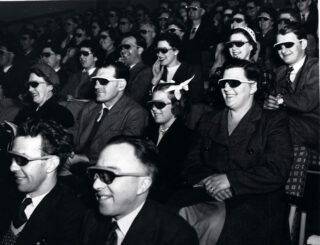
In March, on our way to a screening of Betsey Brown’s new movie at The Roxy, a friend tells me about a little-known secret, a scheme perfect for artsy kids longing to lose themselves in the French Riviera. Trois jours à Cannes: a pass for young cinephiles (ages eighteen to twenty-eight) that provides admission to the film festival for one three-day stretch. A bunch of Columbia grad students she knows are booking an Airbnb together, writing one-page essays about how much they love cinema for their applications. It sounds too good to be true. “Because no one knows about it,” my friend says, “the program is not that selective.” Stressed about whatever it is humanities academics are always killing themselves over, she had yet to submit her application. “You should apply … but don’t tell anyone else about it!”
Unconvinced, I pull out all the stops on my application. To bolster my candidacy with a name the festival organizers will recognize, I ask for a letter of recommendation from an American filmmaker who has built a career straining the audience’s attention, making long observational docs. (He humors my request, patiently). Barely twenty-four hours after submitting, I receive an email from the Festival de Cannes telling me I’m accredited. I book a flight to Nice, four nights in a hotel room. It seems I might have glossed over the details about who pays for what, because when I tell my recommender I got in, he texts back, “Congrats on the fellowship.” Cat-sitting in a bobo Boerum Hill brownstone, I find a book of essays about Cannes’ history by the toilet called Film Festival, and order one for myself with one-click on Amazon.
“Cannes: a few weeks every spring a lobster pot, a battleground of talent, the beginning and the end of iron-strong careers,” wrote Bob Bertina, a Dutch journalist. “Sometimes, hidden in the sand, the seed of a new thought, the inspiration of a great artist.” An essay by another author tells the story of a young man, who, after offering to shine the shoes of every major director he met, landed a supporting role in an upcoming feature. I start taking French lessons again, with a tutor who used to work for a film distributor. He teaches me a new expression: “whatever works, works — if it works,” which he says defines the Cannes film festival.
I inhale too much cold brew one morning in Brooklyn and a plan starts to form: a plot in which my Three Days in Cannes pass presents itself as my chance to fashion myself into a foreign correspondent. I’ve always liked those movies set on the Côte d’Azur, where you’re driving around in somebody else’s red car, windows down, sunglasses on, movies that give you a taste for dramatic self-reinvention. So this is how I got the idea to enter Cannes as a party reporter, break into the heart of the film world, and write about it.
Blinded by my vision, I run into a stroller in Park Slope. The pass was too easy to get and something feels off, but I’m not going to think too much about it. When I tell everyone that I’m going to Cannes, I make sure to put a nervous laugh in front of it. After all, I watched those movies set on the Côte d’Azur with a nagging feeling in my heart I could never quite live them. I’m too pathologically honest to lie to Gwyneth Paltrow, not bourgeois enough to afford a boat ride to Venice.
On a 7:50 PM flight from JFK to Nice, voices pop out of the seats like we’re on a yellow school bus. “Everyone is either on this plane for the Monaco Grand Prix or Cannes,” says the aerospace engineer-turned-consultant sitting next to me. The boy across the aisle turns out to be a three-day-in-Cannes veteran, a software engineer and film enthusiast, still wearing a face mask, named Jackson. Having been to Cannes last year, he has a strategy. He pulls out his phone and shows me a Google Doc where he’s listed all the screenings he really wants to see in italics. “Cannes is a little chaotic, you’ll see,” he warns me. But he loves it. “I plan to do Three Days in Cannes until I’m twenty-eight.”
Jackson has two cardboard signs in his bag. He explains that this is because if you want the ultimate moviegoing experience (attending a premiere) you need to beg for it. You must arrive outside the Grand Theatre de Lumière three hours before the screening dressed in formal attire, hold up a sign, and wait for an industry official to give you a ticket. This is the one scenario where young cinephiles meet film industry officials: standing with cardboard signs under the sun, wearing recycled prom tuxes. “It’s a little bit shameful,” says Jackson, “but it works.”
6 P.M.: I’m in Cannes, outside the Palais des Festivals, the hub of life here and home to five of the festival’s theaters. Jackson is now in a tux along with a few other boys he met on Letterboxd, begging for Claire Denis tickets. The screening isn’t for another four hours. There are still some hopefuls holding out for the Elvis premiere: girls with their hair and makeup done, wearing heels and bright pink and red dresses. Beautiful women saunter by and head straight to the security guard to have their small purses examined, their confident strut making it clear to onlookers that they have a connection.
I lose interest in standing around outside the Palais after about five minutes. Just as I’m about to leave, a woman in sunglasses and a sweatshirt walks up to Jackson and gives him her premiere ticket. My plan for the rest of the night is to walk down the Boulevard de la Croisette and head straight to the Carlton hotel, where I’ll get a martini and eavesdrop with a book open. Except when I arrive outside, it’s boarded up and covered in scaffolding for renovations. A sign outside reads “Carlton Cannes: Once upon a time…”
I leave to check out some other swanky hotel lobbies, but inside they’re dead, and outside the tables are spread out under tents, bistro-style, affording each client a degree of privacy but depriving me of everything. Introspection is not worth a twenty-euro glass of wine so I join the march on the Croisette and become one with the audience. “I want to people watch, all night long,” a guy says to his girlfriend, rejecting her suggestion to eat somewhere dimly lit and private. We’re passing Yves Saint Laurent, Louis Vuitton, Balenciaga. We’re all sweating and smoking, looking to find a perch to watch other people. Jackson is at the premiere now, still in the tux, but without a piece of cardboard attached to him. I avoid a group of middle school girls, distracted on their phones, walking with chocolate gelato torches held out in front of them.
After being stuck in an aimless mob for two hours, I’m relieved to finally be seated for dinner at nine, at a table with five boys (filmmakers in their late twenties) who are full of purpose. Friends of a writer I know in New York, they’re here to gather support for a documentary they’re making and have a pitch on deck to describe their next project. “Really, it’s a movie about relationships,” says the filmmaker. “We’re having encounters with this director’s past actors. And a camera just happens to be there.”
Like the Nouvelle Vague actors they’re working with, they know how to dress, how to talk, and, most importantly, what to order. A bottle of Sancerre and another of burgundy appear on the table within minutes. The cinematographer at the table is not officially on this project but describes himself as a “lead creative force” in it. I believe him, because he tells the waiter we’ll share an octopus, four salmon spaghettis, two tiramisus, and five cognacs. The scene calls for flattery, which the post-production producer offers up. “So, you live in Chinatown and write vibe reports … that must be awesome.”
I ask what it’s like, as people who make movies, to be friends with a critic, turning the conversation toward the friend who connected us. “Well, you know, I think he models himself on the figures of the Cahiers du Cinéma, who got their start writing criticism, but became influential filmmakers in the New Wave,” says the director, introduced to me as a cinephile and “all-round whiz kid.” I wait for a smile to break across his face, but he’s dead serious.
The question of what the rest of the night holds doesn’t come up until our fifth course is over — Lucky Strike butts dead on the table. The guy with Bosnian film school credentials consults a group chat he’s in with forty other young industry professionals. We end up at beach front karaoke. “Which one of us do you want to see sing?” Another one of them asks me.
Two of the boys edge each other closer and closer to the stage. “Look — he’s producing this karaoke.”
Down the Croisette, the Elvis party lights up in the distance (possibility of getting in? “Not a chance,” is the verdict). The post-production producer can, however, get me a table at the bougie Lower East Side restaurant he serves at, whenever. It dawns on me that this is just a boy dressed in black, who can afford to have taste. But who was I hoping to meet? The same could be said of Ruben Östlund.
When I was in college, a girl let me in on a secret: “You know, we spend half our lives waiting in line.” We were waiting to get into a frat party, wearing crop tops and Converse, probably.
While I’m not sure how true this is of life in general, it certainly feels true at Cannes if you’re here on a young cinephile pass. (Press, then industry, get top priority for booking screenings.) When I’m not running around hotel lobbies, trying to figure out what’s “happening,” I do what I’m supposed to be doing here and watch some movies.
A survey of the Three Days in Cannes people I meet at the screenings: a human geography instructor, a nuclear scientist, a Lithuanian on a full-ride at a fratty college in Texas, three software engineers, a group of boys with painted nails who spray each other with Evian mist, each sporting an eclectic tote bag from a different contemporary art museum somewhere in Europe.
I befriend girls by complimenting their hair, a tried-and-true tactic. I try this on a French girl from the suburbs of Paris, and, yes, she’s just gotten highlights. She’s the only person I meet on the three-day pass who tells me she wants to work in cinema, but she talks about it dreamily. Like the everyday girl in a Rohmer movie, she’s charming because of a certain mix of outward curiosity and a willingness to spend all day in the park, remain in obscurity.
She’s never been out of the country. “In New York,” she asks, “what color are the movie seats, usually?”
I meet her at an Irish pub and try to relate. “When you dyed your hair, did it cross your mind at all, that, if you’re going to be in Cannes, you have to do something to try and compete, just a little, with all the glamour and celebrities?”
“I did it to feel good about myself,” she says, and shrugs. This is not the response I am hoping for, given I booked a one-way flight from New York to Nice on a content-mining expedition. Is it honest? Right now, I can’t really trust my own judgement.
The young cinephiles I meet didn’t come to Cannes with lofty ambitions. They just love movies and want to see a lot of them. If you’re not constantly trying to fabricate cinematic ups-and-downs in your own life, maybe it seems worthwhile to queue in line to see four movies a day, work past the aesthetic exhaustion. Is this what it’s like to be free of main character syndrome? I can only imagine.
Cannes is run by the press, buzzing around in lanyards, drinking Nespresso with their laptops open, headphones in to show they’re on deadline. The only member of the press who has time to talk to me is Jack Schenker, who is here with two badges (one for the film magazine he writes for; one from UPenn, the only college he knows of with a festival partnership). The film magazine is Hammer to Nail, which Jack says “nobody reads,” without dropping his tone of enthusiasm. A film critic with a blue check on Twitter threatened to choke him out with an A24 tote bag, calling out the “American fuckboy” who cheered when Benny Safdie’s name came on the screen during the Festival de Cannes opening sequence. He responds to the tweet and identifies himself, so I get a beer with him.
“He did nail me,” Jack said. “I’m a huge A24 stan.”
His impression of the press? “Snobby as hell.”
“I got sick of going to the press screenings because there was no spectacle involved. You go and sit down next to some French journalist, watch the movie and then you leave,” Jack said. “I would much rather go to the Lumière where I was just at — where there’s clapping, introductions.” Ultimately Jack wants to make movies and meet other filmmakers. He had luck getting contacts at the IndieWire party by going up to “all the swaggily dressed people” and saying “you guys are way too cool to be journalists.” But when he tries to get drinks with a director after a private screening, he gets snubbed at the last second.
Cannes turns out not to be much of a lobster pot, but a zoo complete with signs, lines, and lanyards, velvet ropes preventing species from intermingling. Allegedly, Bella Hadid is here somewhere in a tennis skirt, Anne Hathaway is running around in Bulgari. After three days I still haven’t been invited on a yacht, so I don’t meet a single person I can truly call famous, at least at the time of writing. The one established producer I was able to contact was in London by the time my three days started. The people I see on this trip are coming to and from Zara, smoking cigars on the beach, having pictures of themselves taken.
My friend Elroy meets me, and we try our luck getting into the Directors’ Fortnight afterparty. When I found out Elroy was coming to Cannes, I was thrilled — a tall Australian with a collection of white linen shirts? What a great accessory. But even in our best clothes, it’s not possible to get into the real parties. Sometimes the French gatekeepers say everything is impossible at first, then change their mind, if you stand and stare at them for a minute. But both of us can tell this is not one of those instances. Elroy tells me not to be too hard on myself. “Need I remind you that neither of us has ever worked in the film industry,” he says. “Not even for a minute?”
When the Palme d’Or is awarded, I’m eating gelato with my friend from the plane, Jackson. (His favorite movie from the festival was Broker, if anyone’s curious). The next day, the city has emptied out, and all the restaurants I wanted to try are boarded up for the long weekend. I couldn’t find a real bookstore in Cannes, so I head to FNAC (picture Best Buy, then add France’s bestselling authors to it). On display they have a book that catches my attention: Cannes Confidential: Sex, Drugs and Cinema, sold next to a rack of iPhone charging cases. “‘What happens in Cannes, stays in Cannes’ is not a vain expression,” the copy on the back promises.
So I file my failed party report before hotel checkout, then lug my suitcases down to the train station. The train is crowded, but all is not lost; we’re just changing location. I’m headed to Paris. Another little place where Americans still think, if they just show up with their wits, something magic will happen.


